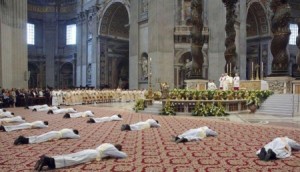God commanded the Jews to utterly wipe out people groups that inhabited Canaan. If this is so, why didn’t Jesus denounce him? Christians often try to avoid this question, it seems to me.
Response (from monergism.com): Actually, I am surprised that it should be avoided as it gives us one of the clearest pictures of one of the most important truths in the Bible: That not only did God take the lives of those he ordered the Israelites to kill (such as the Canaanites) – He also takes the life of everyone on earth. The peoples of Canaan were perhaps dealt out the death penalty earlier than they may have expected; but in essence, their lot was no different than ours. We are all subject to death. Death, as the Bible reveals, is the just penalty exacted for Adam’s disobedience in the garden (Genesis 2:16-17; Rom. 5:12-14). So not only may God take life as he sees fit – he does take the life of every last human on earth (see Heb. 9:27). We should not lose the shock of this fearful truth: death is not natural, it is not a normal process of time and chance, it is not a necessary mechanism of evolution. Humans were created to live, and the fact that they do not bespeaks a terrifying truth – we are all born under divine wrath and judgment.
Indeed we must therefore yield to the fact that God is God and we are not. He alone is the Creator, the Giver of Life – and so he, too, is the Taker of Life. He takes life from whomever he will, whenever he will, and however he wants (1 Samuel 2:6; Job 1:21; Deut 9:4-6, 10:14; Isaiah 45:5-7). Even if we take nothing else into consideration, that alone is more than sufficient cause for us to “lay our hands upon our mouths” (see Job 38-42, esp. 40:4). Doesn’t the potter have a right to make one vessel for honorable use, and another vessel for dishonorable use, from the same lump of clay (Isaiah 45:9-10; Rom. 9:19-24)? Well then, so does God, who created humans from the dust, have the right to do with all of them however he sees fit?
In Deuteronomy 9:4-6 God himself gives the reason for his command to slaughter the Canaanites; but it is of great importance that we also notice the following passage, where God declares that the Israelites were no less wicked than the Canaanites, and deserved the same fate:
4 “Do not say in your heart, after the LORD your God has thrust them out before you, ‘It is because of my righteousness that the LORD has brought me in to possess this land,’ whereas it is because of the wickedness of these nations that the LORD is driving them out before you. 5 Not because of your righteousness or the uprightness of your heart are you going in to possess their land, but because of the wickedness of these nations the LORD your God is driving them out from before you, and that he may confirm the word that the LORD swore to your fathers, to Abraham, to Isaac, and to Jacob 6″Know, therefore, that the LORD your God is not giving you this good land to possess because of your righteousness, for you are a stubborn people.
Deut 7:7″The LORD did not set His love on you nor choose you because you were more in number than any of the peoples, for you were the fewest of all peoples, 8 but because the LORD loved you and kept the oath which He swore to your forefathers, the LORD brought you out by a mighty hand and redeemed you from the house of slavery, from the hand of Pharaoh king of Egypt.”
This latter passage directly relates Israel’s mandate to destroy the Canaanites and possess their land to what God had done for Israel in Egypt; therefore, it is vital to understand how God had just redeemed the nation of Israel. The climactic event marking Israel’s exodus from slavery was the Passover; and in the Passover, the people all had to paint a lamb’s blood on their doors so the angel of death would pass over their home (Exodus 11-15). If they did not apply the blood of the lamb, their firstborn would have been taken just like the rest of the Egyptians – they deserved the same judgment and only escaped it by the blood of the lamb. Continue reading




